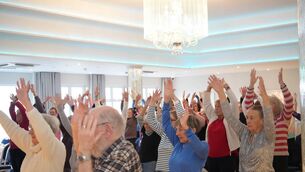Gathering data on the impact of hormones on women’s Parkinson’s symptoms

Richelle Flanagan, founder of My Moves Matter, an app designed to help people with Parkinson’s Disease to track their symptoms.
PARKINSON’S Disease is a neurodegenerative illness that can affect a person’s movement, mental health, pain and sleep.
It is the second most common neurodegenerative disease globally; approximately 10 million people are living with it currently, and that figure is expected to rise to 17 million by 2030.
Its symptoms range from tremors and painful muscle contractions, to anxiety, depression and sleep issues. These symptoms worsen over time. Medication and other therapies are aimed at managing the symptoms but there is no cure for Parkinson’s Disease.
Parkinson’s Disease is slightly more common in men than women; about 40% of those with Parkinson’s worldwide are women.
Women experience symptoms of the disease differently than men. The non-motor symptoms - depression, anxiety, sleep issues - tend to be more prominent in women, and new research shows that the severity of the symptoms in women can vary according to their menstrual cycle or other hormonal fluxes, like menopause.
Charting the links between menstruation and worsening Parkinson’s symptoms
Instrumental in this research is Dublin dietician Richelle Flanagan, who discovered her own Parkinson’s when she was three months pregnant with her daughter. Although Parkinson’s is generally known as a disease in older people, it can also occur in those under the age of 40.
After her diagnosis of Young Onset Parkinson’s Disease, Richelle attended the World Parkinson’s Congress in 2019. It was here where the seeds of her research and the development of the My Moves Matter app began in earnest.
“After my diagnosis, I noticed that my symptoms were worse in the week before my period. It was like PMS but on speed,” explains Richelle.
At the time there was no other research into this area, but when I attended the Congress I met young women like me who had similar experiences with their symptoms around their periods.
After the Congress, Richelle founded the Women’s Parkinson’s Project and set out to establish the link between hormones and Parkinson’s symptoms.
A global survey of 180 women, conducted by the project, showed that 80% of women reported their symptoms worsened around their period, and their medication wasn’t as effective at this time.
Despite these figures, relatively little is known about the links between Parkinson’s symptoms and menstruation. This is what Richelle is trying to change with her My Moves Matter app.
“With funding from New Frontiers and my local enterprise office, I launched the My Moves Matter app in July, 2023, and we’re on track to have 1,000 users by the end of March,” says Richelle.
What I wanted to do with the app is to give women a way to track their symptoms during their menstrual cycle. In this way, they can validate what they are experiencing and they have data they can share with their neurologist.
Once she was diagnosed, Richelle hid her diagnosis for two years. She feared the stigma of Parkinson’s and people thinking that she was less capable.
But since going public with her disease, she has jumped into patient advocacy, with a keen focus on women with Parkinson’s and those with Young Onset Parkinson’s. The My Moves Matter app is a natural extension of this.
“I wanted to create an app that empowers people with Parkinson’s and helps them to understand their own data. Ultimately, I wanted to put the power back in their hands,” says Richelle.
The neuro-friendly app design features large buttons so that users who may be experiencing motor issues can still log their symptoms.
It also offers users the ability to track their symptoms using voice recordings, photos or videos. Users can track their motor and non-motor symptoms, period and menopausal symptoms.
They can also log their exercise routine and medication.
It is the only app in the world that tracks neurological symptoms across the menstrual cycle or logs menopausal symptoms in relation to medication intake.
Gathering data on the impact of hormones on women’s Parkinson’s symptoms
My Moves Matter is a key component in a world-first study charting the impact that hormonal fluctuations can have on women’s Parkinson’s symptoms. In early 2022, Richelle teamed up with Professor Aideen Sullivan in University College Cork (UCC), with support from the Health Innovation Hub Ireland (HIHI) and Enterprise Ireland, for the study.
Participants will use My Moves Matter to record their symptoms across their cycle. Women from all over the world, and at all stages - menstruating, pregnant, perimenopausal, menopausal, post-menopausal - are taking part. The objective is to gather clear evidence that hormones have a negative effect on women’s Parkinson’s symptoms, so that more targeted and effective treatment can be provided for women.
Richelle is beginning to see changes, albeit at a slow pace.
“When I was first diagnosed with Parkinson’s seven years ago, hormones were not mentioned at all. But we’re changing the conversation, and more women are now asking the questions.”
My Moves Matter, which is freely available on Google Play and iTunes, is proving to be a fundamental part of changing that conversation.







 App?
App?


